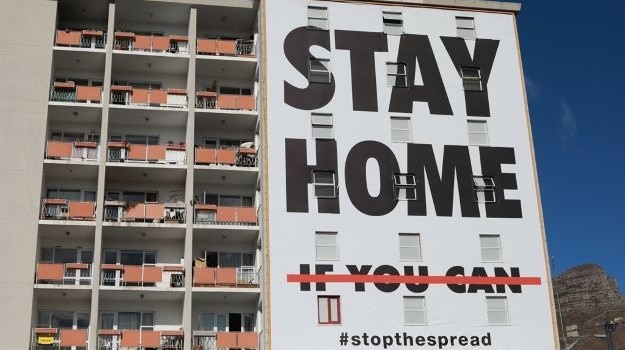2020-04-28 06:00

We simply don’t have the luxury of an enduring emotional bond with being in lockdown. It is a fear we have to overcome if we are all going to survive this pandemic, be it from a health or an economic perspective, writes Mandy Wiener.
Each week, since 23 March, President Cyril Ramaphosa has stood (or sat) before the nation and asked us to sacrifice a little more, to continue to stay at home to flatten the infection curve.
Millions have been captivated by these addresses as he holds our fate in his hands, precariously balancing lives and livelihoods, restarting the economy in the face of growing numbers of Covid-19 cases.
Ramaphosa has been lauded for his decisive response and firm leadership, painted in memes as a superhero and appreciated in #CyrilFridays posts, despite that treasonous mask.
Now in the fifth week of a hard lockdown, harder than most other countries around the world, we are dealing with the reality of downgrading from Level Five to Level Four of a staggered risk approach.
For the first two weeks of lockdown, it was a novelty.
We baked, we exercised, we Zoomed.
The next two weeks the frustration built at not being able to exercise outdoors, to socialise, to get out the house, to buy roast chickens or smokes.
And now in week five, I’m finding that we’ve settled into a familiarity with our pared down lives and an adjustment to this new normal. We have had an opportunity to push Ctrl+Alt+Del and reset.
Safe in our cocoons, isolated from the stealthy, invisible killer lurking in supermarkets and offices out there.
(Disclaimer: This is a privileged middle class experience I’m describing and is definitely not the reality for most South Africans who have been forced into lockdown in very different conditions without luxuries).
Now that the restrictions are being ever so slightly relaxed, do we really want what we have been asking for?
The world is no longer the place it was BC – Before Coronavirus. It is new territory that fills us with anxiety and trepidation.
“What if what we’re feeling is a kind of Stockholm Syndrome?” I asked a clever psychologist friend.
“We have formed an emotional bond with our captor which in this case is the virus?”
Stockholm Syndrome of course is a condition first used by the media in 1973, when four hostages were held during a bank robbery in Stockholm in Sweden.
They defended their captors after being released and would not testify in court against them. They had formed a psychological alliance with them.
“Stockholm Syndrome is a trauma response,” she pointed out, noting that we are all experiencing is a degree of trauma.
“There’s definitely a feeling, a notion of the collective and we have been awaiting instructions from this paternalistic figure in the form of Cyril so in a way there has been a trauma and we have regressed to a situation where we don’t have to make decisions for ourselves.”
Over the past month we have found ourselves in a near totalitarian state, relinquishing our civil liberties to the government in the interests of fighting the virus.
This has raised very real concerns around the abuse of power by security forces and an encroachment on our privacy, such as through the tracking of phones ostensibly to trace contacts of patients.
But it is an almost benign dictatorship, where we are all buying in to these actions as they are for the greater good.
By agreeing to relinquish our freedoms, we are doing our part and contributing to combating the pandemic and keeping the most vulnerable safe.
Each week, as the President speaks to us, he shows deep care and empathy.
There is a tone of concern.
As South Africans, this is not an approach we are familiar with.
We are not used to feeling so attended to in this way.
Even in his most recent address, as he explained the shift to Level Four, he was successfully able to sell the country a lockdown extension packaged as an opening of the economy.
We have developed an attachment to him as we no longer had to make decisions for ourselves and take responsibility for those decisions. It is a personal regression of sorts.
While we initially struggled with not being in control, we have come to enjoy it to a degree. We no longer have decision fatigue.
We were being told what to do and what not to do. Our worlds have shrunk, cooped up in our homes with fewer demands. It is the appeal of submission.
But now as we have to make choices for ourselves around whether or not to venture out, we may feel daunted. That is combining with the fear of the actual virus.
Even if the authorities are telling us that we can go out because we fall into “Level Four” workers, we are questioning whether we actually feel safe enough to venture out.
The great German philosopher and psychoanalyst Erich Fromm, in his 1941 seminal work “The Fear of Freedom”, explored humanity’s shifting relationship with freedom and the personal consequences of its absence.
It’s relevance today resonates as it did at the time of its release during World War II.
In it, he asks, “Can freedom become a burden, too heavy for man to bear, something he tries to escape from? Is there not also, perhaps, besides an innate desire for freedom, an instinctive wish for submission? If there is not, how can we account for the attraction which submission to a leader has for so many today?”
We have relied on the government to keep us safe and now with restrictions relaxed, we have to make the decisions ourselves. Do we trust the loosening of the reins and do we trust ourselves to make those judgement calls?
But we cannot afford to relinquish control to our captors forever.
It is imperative that the economy restarts, that we get out and spend money and save jobs.
We simply don’t have the luxury of an enduring emotional bond with being in lockdown.
It is a fear we have to overcome if we are all going to survive this pandemic, be it from a health or an economic perspective.
All this means that we now have to overcome our anxieties to balance these two competing considerations and balance two curves – the curve of the virus and the curve of the restriction on the economy.
We have to get out of lockdown while managing the risk of doing so.
We are going to have to take complex decisions for ourselves and use our powers of discernment as we enter this grey area of post-lockdown life.






